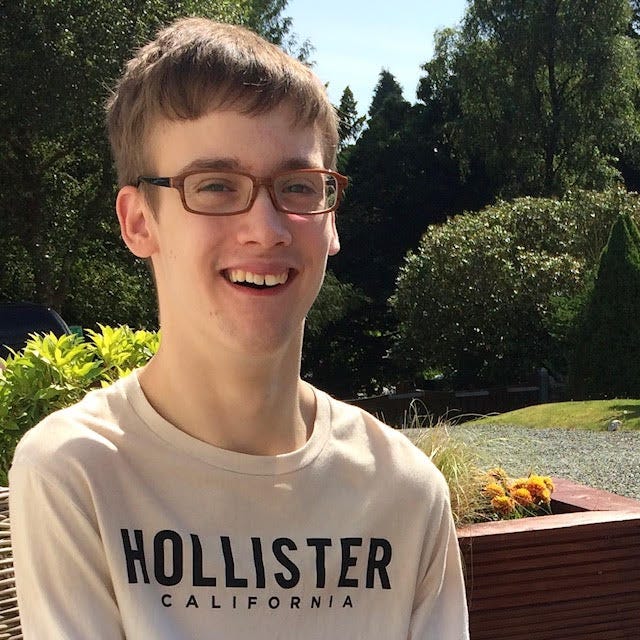The Fear Of Offence Stifles Meaningful Dialogue
We cannot avoid dealing with sensitive issues out of a fear of offending or being offended.
- James Forsdyke.
Rosie Jones has found herself in hot water over her Channel 4 documentary, 'Rosie Jones: Am I A R*tard?'. The British comedian, who has cerebral palsy, said she wanted to use the controversial title to make 'people think twice before ever using [it] again'.
But will it work?
The show, which aired last week, paints a disturbing picture of life as a disabled person in Britain. I also have a type of cerebral palsy, and while my experiences are different, having never been a target of abuse to anywhere near the extent that Rosie has, I certainly have a lot of empathy for her position. It focused on some of the most egregious comments that Rosie has received on social media. Many of these stem from the confusion between physical and cognitive disability, and the perception that one inevitably arises with the other.
Even those who mean well can make this mistake. For instance, some dumb down their speech when talking to me. It’s not a regular occurrence, and my philosophy has always been to put them right. Now that I’m able to say that I study Philosophy, Politics and Economics at Oxford, have served two terms as the Oxford Union’s Disabilities Officer, and am now co-president of two student societies, it's something that is easier for me to do. Personally speaking, I prefer to focus on what people with disabilities have been able to do, the ways in which some have been able to revolutionise modern knowledge, and the people who have channelled their experiences into something for the betterment of society. Highlighting discrimination where it exists is important, but that should never be the end of the story.
Rosie, as a successful comedian, is someone who has challenged some people's assumptions about those with disabilities. The documentary highlights this. Her world tour, many TV appearances, and two published books have led to her becoming a prominent face in the British media. If she’s set her mind on making a documentary, she’s bound to do it well.
Highlighting discrimination where it exists is important, but that should never be the end of the story.
Her decision to include in the title what has been described as an ableist slur, won’t have been a decision taken lightly and was bound to have been for a very good reason.
Nevertheless, before the show aired, it emerged that three contributors had pulled out, specifically because they wanted the title changed. Model and disability activist Kate Stanforth withdrew, Tweeting: “Disabled community, we got you”, before promptly using the hashtag “#AmIARetard”.
So all of a sudden, context matters? I cannot emphasise the incredulity with which I read that. A comedian uses a slur in a documentary in order to highlight disability related prejudice, and that’s inappropriate, but when somebody else condemns that and subsequently Tweets the same word in order to supposedly highlight a problem with the title, that’s fine? I think we should be more charitable to Rosie and believe her when she says she made the decision to, “confront this word, and other ableist terms head on”.
Throughout the documentary, she makes this point, even delivering a giant cookie to Twitter’s headquarters with “Am I Retarded?” iced onto the top. Her discussions relating to social media were particularly interesting. In conversation with social media analyst Drew Benvie, attention is drawn to the idea that social media might be amplifying the extremes. Certainly, those who post the most on social media are more likely to hold very strong beliefs, and it makes sense therefore that we often see the worst in people on such platforms. Social media is awash with algorithm-intensified extremism, abuse and tribalism. Many of the comments that she and others have received are utterly indefensible. I think perhaps that any ordinary person given the wrong set of circumstances can unfortunately find themselves becoming detached from reality, from empathy, and particularly so when hiding behind the virtual distance of social media, forgetting that there’s a real person on the other end of the line.
On Elon Musk’s Twitter takeover, Mr Benvie attributed the rising emphasis on freedom of expression on the site as a source of hateful content, “free speech walks perilously close to hate speech”. Again, the idea that allowing people to speak freely will inevitably give rise to hateful speech is undeniably accurate, but I think that questions still remain about how we should deal with such abuse. The problem is that as we’ve seen from the initial reaction to Rosie’s choice of title, offence is a statistical inevitability, and that’s precisely why I don’t think we should censor based upon perceptions of it, as difficult as it is to arrive at that conclusion. If offended critics had had it their way, she wouldn’t have been able to make her case the way she wanted to.
So how do we deal with the problem? It’s obvious that people can go out of their way to make each other’s lives difficult. Talking to BBC journalist Nikki Fox, the two express their disbelief that so many would go out of their way to make such attacks. It is quite astonishing, and I think that much of it is symptomatic of a wider social phenomenon, of hypersensitive assumption making. Ms Fox alludes to comments that she had received while working on Watchdog, a consumer investigations program, which made the accusation that her involvement was a “tick-box exercise”. Discussion of affirmative action can often have unintended consequences. When people such as Rosie or Nikki, who have certain characteristics, are clearly capable of achieving great things, it’s sometimes wrongly assumed that they didn’t actually get there on merit.
Similarly, some of the more divisive aspects of modern political discourse can set people against each other, and one side will often make assumptions about the other. Cognitive shortcuts like this take away our humanity. People are complex, and as Rosie says at the end of the program, the way forward is education. Rosie’s bravery in taking part in a conversation with a former social media troll should be an example to us all. Perhaps reaching across these divides and learning more about one another would bring about some much-needed mutual understanding. This is wider than just ableism, the conclusions we must draw are more far reaching. People talk about the ‘disabled community’ as though we’re all homogenous androids, but as we’ve seen recently, disagreements are common. I certainly don’t have a membership card. I hear however, that Gordon Brown, Oscar Pistorius, and Abu Hamza do regularly meet up for coffee; it’s just a matter of ‘being in the know’.
I think it’s important to recognise that everybody is going to face a different set of challenges, and we’re all just trying to make the best of it. We’re all different, we all make mistakes, we go about making the world a better place in our own unique ways; and education will always win over censorship.
James Forsdyke is a student from North Yorkshire, currently reading Philosophy, Politics and Economics at Brasenose College, Oxford. He is Co-President of the Addington Debating Society and the Brasenose PPE Society, having previously served as Disabilities Officer on the Oxford Union committee. You can read more from him and subscribe to his Substack here.









Awesome article James. Thank you
Kudos and splendid! Keep writing into our humanity.